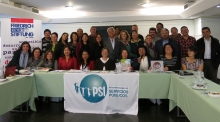Campaign against TPPA and TISA approved in PSI's regional meeting in Chile

By Nayareth Quevedo
More than 30 participants from Costa Rica, Colombia, Brazil, USA, Mexico Panama, Peru, Uruguay and Chile met in Santiago on 12 and 13 April to agree on actions against two free trade agreements: the TPPA (Trans-Pacific Partnership Agreement) and TISA (Trade in Services Agreement).
The meeting was organized by the Public Services International (PSI) and sponsored by the Friedrich Ebert Stiftung (FES), who since last year is financially supporting union initiatives against this type of treaty.
Unionists agreed that the secret negotiations for the elaboration of trade agreements, unbeknownst to the citizens and parliaments, will affect not only democracy and the sovereignty of countries, once will allow that transnational corporations sue states when they see their interests threatened, but also will affect the public services, one of the most impacted sectors with TPPA and TISA.
To the above is added the fact that agreements such as the TPPA contain a special chapter on State Enterprises and Designated Monopolies (Eyme), aimed at reducing state involvement in the commercial sector and provision of basic services.
"All countries negotiating these treaties need information; hence the importance of the campaign that has just been adopted and the quality of the contributions that each of you made here", said Deborah Jame, from the Our World is Not for Sale network, while emphasizing the work with PSI and the vision of "Buen Vivir" for public services that it has highlighted in the region and the world.
Finally, in addition to assessing the regional articulation that this type of space provided, representatives of unions affiliated to PSI agreed to make mobilization efforts, strategic partnerships with civil society, lobbying with the various parliaments and campaign material that allows sensitize citizenship through a simple language to explain the negative impact of both the TPPA and the TISA.

